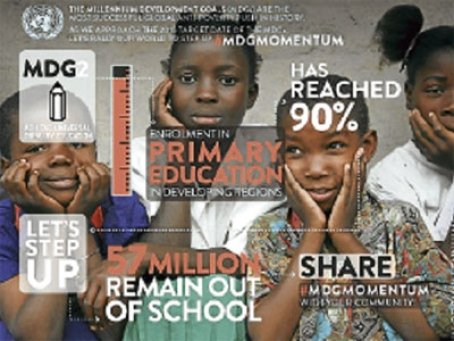Is quality education enough?
Professor Tan Sri Dato' Dzulkifli Abdul Razak
Learning Curve: Perspective
New Sunday Times - 22-09-2013
THE First Non-Governmental Organisation (NGO)-United Nations Educational, Scientific and Cultural Organisation (UNESCO) Forum, themed Which Education Goals For Tomorrow's Citizens Of The World: Is Quality Enough?, will be held in Paris, France tomorrow.

A Millennium Development Goals Report 2013 infographic shows that there are still a number of gaps despite some success in increasing basic education for children in many countries.
The forum provides opportunities for collective thinking on education as well as current and future objectives.
It also offers support to ongoing or new UNESCO initiatives for the post-2015 period.
The EFA, a global agenda started in 1990 and renewed in 2000, is based on six EFA Goals, namely, develop early childcare and education; offer children access to free and compulsory primary education; ensure that young people and adults have access to life skills and appropriate learning; achieve a 50 per cent improvement in adult literacy; eliminate gender disparities in primary and secondary education by 2005 and achieve gender equality in education by 2015; and improve all aspects of education quality.
With only two years to go, the progress made in these areas has been found wanting.
Some of the goals, for example, universal primary education and gender equality and women's autonomy, overlap with the Millennium Development Goals (MDGs) which also ends in 2015.
Despite some measured success in increasing basic education for children in many countries, there are still a number of gaps.
Disparities by country and region, and even within countries continue. Citing 2010 statistics, the EFA Global Monitoring Report says aims that are not similar to the MDGs have been neglected.
More than half of the world's children are without access to preschool, 200 million youth have not completed the primary cycle, 775 million people are illiterate and unequal learning outcomes remain. Moreover, world progress has declined.
These shortcomings are allegedly accompanied by other intractable problems concerning sufficient and appropriate school infrastructure, the finance of education systems or recruitment and training of education professionals, especially teachers.
Many countries are finding it more difficult to recruit and train teachers as well as retain them in the profession beyond the first five years of their careers.
In this context, it is imperative that the UNESCO Collective Consultation of NGOs for EFA adopt the recommendations on achieving the EFA Goals at tomorrow's forum.
There is a need to push all stakeholders, including the higher education sector, to achieve all the objectives and give priority to discriminated and marginalised children and young adults, especially girls and women.
The development of vocational education is another area to look into.
Designed to secure foundation skills for young people, it should not be limited to a narrow conception of skills and the immediate needs of the labour market.
It should include citizenship education and other types of knowledge. Furthermore, many youth need mentoring.
Support for vocational education in the informal and subsistence economy should be appropriately contextualised.
Though quality education is essential, the forum intends to go further and address obstacles, propose solutions to resolve the EFA before and after 2015.
A UNESCO commission is revisiting the Report of the International Commission on Education for the 21st Century entitled Learning: The Treasure Within.
The report defines six areas of research -- development, Science, citizenship, culture, social cohesion and employment.
Based on a resolution adopted during the International Conference of December 2012, several NGOs in partnership with UNESCO can increase their contribution to education and shape the future education agenda beyond the question of quality.
While quality is one of the aspirations for education as stated in the Malaysia Education Blueprint, it must be intricately linked to the goals of access, equity, efficiency and national unity in a comprehensive ecosystem.
By providing ample opportunities for the community including NGOs to play a role, the blueprint is well aligned with the first NGO-UNESCO Forum's aim to see education as a basic universal right. The inputs from civil societies and NGOs, by any means, are crucial to make a lasting difference.
The writer is president of the International Association of Universities, Paris.
The writer is also Chair of the Independent Review Panel of the Malaysia Education Blueprint
